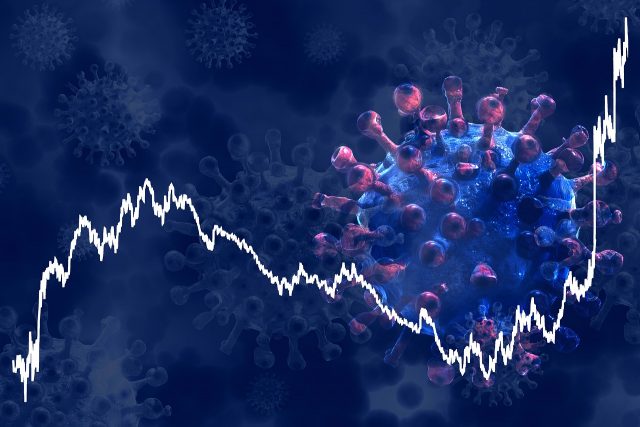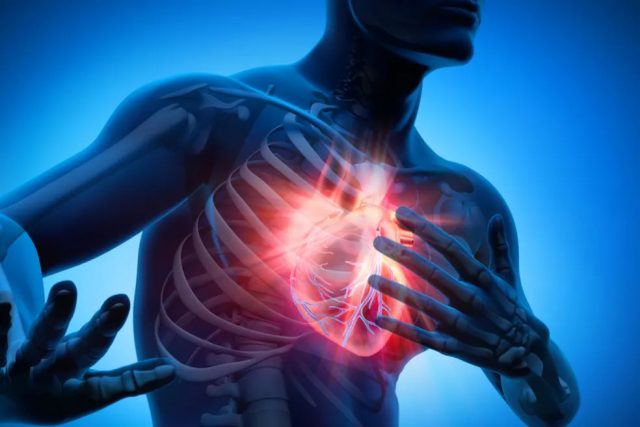According to a recent Oxford-led study, more than half of COVID-19 patients with a serious infection, or 5 out of every 10 patients, have a high risk of having a heart attack days or weeks after recovery. Many people recover, while others die.
It has also been observed that some people who had no heart concerns before getting COVID-19 had cardiac problems after recovering from the virus infection.
While we’ve long known about the virus’s effects on essential organs, recent months, particularly during the second wave, have seen a higher incidence of post-COVID heart attacks among people who have recovered, demonstrating that there’s still a lot we don’t know about the virus’s potential to affect our health.
But what explains the link between COVID healing and heart attacks? What do doctors have to say about it?
What Do We Know About Post-COVID Heart Damage?
The SARS-COV-2 virus, which is known to produce inflammation in the body, can be exhausting. Numerous studies have shown how dangerous a virus can be to human health, from the lungs to the brain.
Following recuperation, the heart may be severely harmed. Severe inflammation and myocardial injury is one of the main reasons for this.

According to Dr. Anil Kumar R, Lead Senior Consultant Cardiologist, Aster Centre of Excellence in Cardiac Sciences, Aster Medcity, Kochi, Kerala, the virus causes a lot more inflammation than any other viral infection that causes problems: “During the course of a COVID infection, there’s acute inflammation that happens to the blood vessels, blood clots which cause damage and result in heart issues.
The risk for heart ailments, we feel, is higher for COVID patients because of the added level of inflammation in the body and stress the heart faces in such critical times,” adding that most cases of a heart attack come up in the first month or so of recovery.
Dr. Sanjay Mittal, Senior Director- Clinical Cardiology and Research at Medanta, The Medicity, further points out that patients with cardiac disorders are more likely to have COVID issues. The virus can cause a lot of vascular damage and viral toxicity, which causes illnesses and weakens the heart muscles, making a serious infection with the virus even more dangerous.

Is There A Link Between COVID-19 Infection And Heart Attacks?
“The Delta variant, as we know, is very infectious and spreads faster, numerous exposures, high viral load unleashes a lot of weakness in the body,” Dr. Kumar says, adding that the increase in such cases has been seen more during the second wave, and in individuals with higher exposure risks.
While it is unrealistic to suppose that the SARS-COV-2 virus is the only cause of a heart attack, experts feel that there are various risk factors and conditions that increase one’s risk of having a heart attack after recovery.
The physicians also point out that, while the risk is modest, precautions must be taken.
In many cases, we’re also discovering that there was already a low-level risk of heart attack, and COVID simply accelerates it. To put it another way, it’s not usually COVID that causes heart attacks, but rather a worsening of difficulties and comorbidities.
He also mentions the intriguing risk of extended COVID heart syndrome, which causes a variety of cardiac slowdown and alarming symptoms including heavy heart rate, impaired lung function, and muscular weakness, among others.
Myocarditis, or inflammation of the heart’s main muscle, has long been thought to be a secondary consequence of viral infections. In fact, some experts feel that immunizations may increase the risk of myocarditis, which is something that people, particularly those with a history of heart problems, should be concerned about. Cardiomyopathy worsening is also a cause for concern.
Also Read: Who Are Asymptomatic COVID Carriers And How Serious Can They Be For Others?
Preemptive symptoms, or warning indications that strike a patient before the real pain, are also thought to exist in heart attacks, according to doctors, and can pile up over time. Because of COVID-19, many of these symptoms may be misdiagnosed or dismissed as something less serious, resulting in more harm.
Aside from that, there are a number of additional key risk variables that have been identified. Aside from the pandemic, other major risk factors that have been linked to an increased risk of heart attack have also increased as a result of the extended change in working conditions.
“It’s natural to gain weight during a pandemic, but we’ve seen patients gain as much as 10-15 kilograms, plus they’re not socializing, are under more stress than usual, and are exercising less.
Sugar and cholesterol levels are out of whack, and all of these things can lead to problems over time. One highly crucial factor that many people overlook is stress, “ says Dr. Mittal, who predicts that the new normal will cause more health problems for those in their 30s and 40s.
What Are The Warning Signs To Look Out For?
With doctors reporting an increase in COVID recoveries associated with heart problems, patients should be aware of the following symptoms and warning signs:
- Sweating, pain around the shoulders or jaws -Sudden chest pain
- Arrhythmias (Irregular and erratic heartbeat)
- Sudden pulsations
- Clotting of the blood
According to statistics, occurrences of growing heart attack or heart failure are most common within the first three months following recovery, therefore take all precautions to reduce your risk.
Doctors Emphasize The Importance Of Determining The Hazards.
Post-COVID recovery necessitates a great deal of attention and assistance, especially in the first several weeks. If a person has had a severe infection or has been hospitalized, it is critical that they follow up with their prescriptions, rest, avoid overexertion, and, most importantly, avoid heavy-duty work for at least a few months in order to heal properly.
A healthy diet and way of living should also be emphasized.
Due to the exponential increase in heart problems reported post-COVID, doctors are now encouraging patients (especially those at risk or with comorbidities) to be extremely cautious with their workouts, control stress levels, and not hurry back to normalcy.
Everything might be stressful for a weak, inflamed heart, so take precautions, experts advise. We do suggest patients not just take their activities or level of exertion a notch down, but there are a number of tests that should be paid attention to.
For example, if post-COVID the person still has elevated blood counts, elevated D dimer, and elevated ferritin, it’s an indication that the body hasn’t completely settled down, and they may have a higher risk of a heart attack.
He also adds the need to identify at-risk patients at the clinical level, and advocates the use of strong blood thinners to curb the risk. They also encourage patients not to engage in strenuous exercise right after their recuperation.
More techniques to take care of the heart include getting echocardiography exams and regularly reviewing symptoms at home. “People are not safe right after COVID. They need to be evaluated thoroughly if there is any long-COVID haulers syndrome or persistent inflammation. Any kind of tissue injury, commonly seen in the lungs, heart, or brain needs to be looked into”, Dr. Mittal says.
Aside from the lifestyle changes, doctors stress the importance of patients getting preventive checkups and testing to determine their overall health.
Disclaimer: THIS STORY IS FACT CHECKED
Sources: Times Of India, First Post, Harvard Health Publishing +more
Image Source: Google Images
Find the blogger @ParomaDey
This post is tagged under health, coronavirus, SARs-COV-2, covid, alpha, beta, delta, Omicron, Delmicron, third wave, World Health Organization, third wave, Satyendar Jain, Sutra model, IIT Kanpur, European Medicines Agency, Dr Monica Gandhi, Bloomberg, California University, Professor Ian Jones, University of Reading, Dr Anil Kumar, Aster Centre of Excellence in Cardiac Sciences, Dr Sanjay Mittal, Medanta The Medicity, chest pain, palpation



































